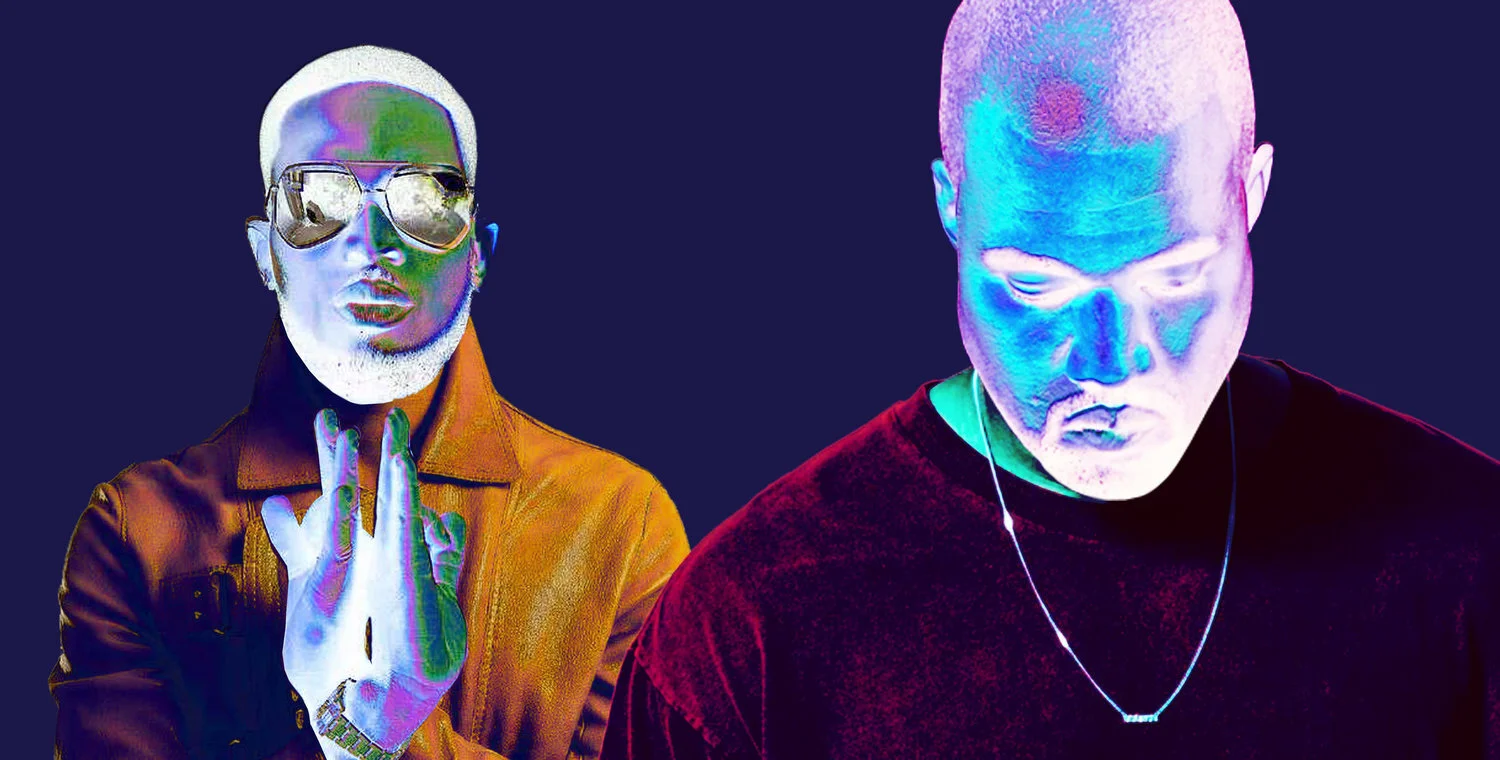Mr. West runs into the King of Afrobeats
Illustration by Ope Arogunmati
The chance meeting between Kanye West and D’banj appears as though the universe wanted these two talented musicians within arms-length. At the time, Kanye West was carrying the torch for Hip Hop music with his distinct Ralph Lauren polos, soulful production and an unapologetic attitude for his immense talent, he managed to usher a new Hip Hop period that was under a strangle hold by 50 Cent. On the other end of the world, in the biggest country in Africa, Nigeria, a new genre was bubbling to the surface led by artists such as D’banj and Wande Coal leading the wave for the new genre called Afrobeats. In 2011 when D’banj crossed paths with Kanye West at a mall, Afrobeats was still in its infancy and would take a few more years before the sound would make it across the Atlantic to America.
According to D’banj, at the Dubai airport where he met Kanye, he played some music for him and they would decide to reconnect in New York City. Kanye was enamored by the sounds that Mo Hits was producing and with D’banj seeking a grander audience to gain more notoriety through an established artist like Kanye West, he decided to partner with GOOD Music. This would lead to D’banj departing from his long-time producer Don Jazzy.
D’banj signing to GOOD Music was supposed to be the introduction of the Afrobeats sound to the world; this never happened, leading D’banj to a six-year hiatus that would see his position usurped by artists like Wizkid and Davido.
In the present, when you consider the landscape of the American music business, specifically Hip Hop, artists have split between two camps, which happen to be Trap Soul or Afrobeats. Drake, Wale and Chris Brown have been on a few records channeling the Afrobeats sound and many might give them credit for adopting the sound and sharing with Americans, which they deserve, but I believe Kanye West took the first leap and should not be ignored from this conversation.
In 2009, when I visited Nigeria, I discovered the spirit of Afrobeats. It was ubiquitous throughout Lagos State. This was the only sound in the streets and I remember having conversations with the locals about how fast the sound spread through the country. Back then I was not sure how massive it would become but I knew it would change the Nigerian and African entertainment industry if it ever got the chance to be disseminated across the world.
I knew that the infectious beat and rhythms had an air of positivity that was missing in the marketplace.
Fast forward to 2011 when Kanye West met D’banj in that airport, I wonder if he could sense the enormity of the artist he met and the sound he was curating. At just 2 years after my discovery, he was ready to get D’banj on board. Kanye had the foresight for the music, but I believe he lacked the knowledge to assimilate the sound into the American conscious. That same year Kanye was coming off his critically acclaimed studio album My Beautiful Dark Twisted Fantasy, which brought sounds and story-telling that was unlike anything done by a rapper. While he had the foresight to recognize Afrobeats, I wonder if he had the time to understand the marketplace and its apetite for a new sound.
There have been many criticism of the deal between GOOD Music and D’banj because he did not release any records under the label except for his participation in the compilation Cruel Summer. These criticisms are valid, however, Afrobeats was too new for the American public to accept in 2011. When you compare the landscape to today, Afrobeats was still gaining momentum in Nigeria, streaming was still in its infancy and was yet to capture the continent it came from. D’banj was caught in the dilemma of being the first artist to try and branch out into unchartered waters. He sunk, but this is the plight of being a risk taker. D’banj was unaware of the difficulties of a merger and it would result in him sitting on the bench for six years.
In business combinations, for example a merger, companies look for certain patterns in the marketplace before they decide to consummate the relationship. The key patterns that practitioners look for is the ability to create synergies between the two companies, establish if there is potential to dominate the market, utilize key intellectual property or expand into another geographic market. I doubt that this form of pattern recognition was discussed between Kanye West and D’banj at the time. There is a high likelihood that Kanye West and D’banj appreciated their individual creativity, but failed to acknowledge whether there were any synergies before consummating their relationship. For example, D’banj and his producer Don Jazzy separated at the initiation of the deal with GOOD Music, resulting in D’banj losing his sound and joining a production house that was catering to American artists doing American music. Furthermore, it is unlikely that GOOD Music was using D’banj as a way to get into the African market, so geographic expansion for the entire GOOD Music was not in the cards in this merger deal.
These points are revisionist and I would be surprised if D’banj and GOOD Music going their separate ways did not think about the alternate outcome, which would have led to D’banj maintaining his king status in Afrobeats beyond just the acknowledgment by his peers.
D’banj is a great artist who took the risk that many would have turned away from at the time because of complacency from being the top Afrobeats artist. The benefit of the deal was to build awareness of Afrobeats and provided a vision for the upcoming acts to aspire.


